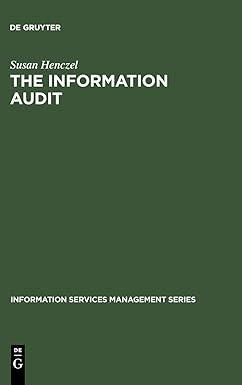Question
Answer T or F 1. Notes receivables can also be called trade receivables. 2. Receivable from company owners and officers should be disclosed separately on
Answer T or F 1. Notes receivables can also be called trade receivables.
2. Receivable from company owners and officers should be disclosed separately on the balance sheet.
3. Receivables not currently collectible are reported in the investments section of the balance sheet.
4. Since those responsible for receivables record keeping and credit approval do not handle cash, these duties do nor need to be separated to maintain food internal control.
5. Maintaining the Accounts Receivable control account and the Accounts Receivable Subsidiary Ledger should be assigned to the same employee for good internal control.
6. When companies sell their receivables to other companies, the transaction is called factoring.
7. Of the two methods of accounting for uncollectible receivables, the allowance method provides in advance for uncollectible receivables.
8. The difference between Accounts receivable and its contra asset account is called net realizable value.
9. The estimate based on sales method violates the matching principle. 1
10. When the estimate based on analysis of receivables is used, income is reduced when a specific receivable is written off.
11. When an account receivable that has been written off is subsequently collected, the account receivable is reinstated.
12. Although Allowance for Doubtful Accounts normally has a credit balance, it may have either a debit or a credit balance before adjusting entries are recorded at the end of the accounting period.
13. At the end of a period, before the accounts are adjusted, Allowance for Doubtful Accounts has a credit balance of $250, and net sales on account for the period total $500,000. If uncollectible accounts expense is estimated at 1% of net sales on account, the current provision to be made for uncollectible accounts expense is $4,750.
14. At the end of a period, before the accounts are adjusted, Allowance for Doubtful Accounts has a credit balance of $500, and net sales on account for the period total $800,000. If uncollectible accounts expense is estimated at 1% of net sales on account, the current provision to be made for uncollectible accounts expense is $8,500.
15. Allowance for Doubtful Accounts is a liability account
16. At the end of a period, before the accounts are adjusted, Allowance for Doubtful Accounts has a credit balance of $2,000. If the estimate of uncollectible accounts determined by aging the receivables is $30,000, the current provision to be made for uncollectible accounts expense is $30,000.
17. At the end of a period, before the accounts are adjusted, Allowance for Doubtful Accounts has a credit balance of $5,000. If the estimate of uncollectible accounts determined by aging the receivables is $50,000, the current provision to be made for uncollectible accounts expense is $45,000
18. When using the estimate-based on sales method, the entry to record uncollectible accounts expense includes a credit to the Accounts Receivable account.
19. When using the estimate based on analysis of receivables, the amount computer in the analysis is always the required amount that would be recorded in the adjusting entry. 20. The allowance for doubtful accounts is similar to accumulated depreciation in that the account represents the required amount that would be recorded in the adjusting entry.
21. Generally accepted accounting principles do not normally allow the use direct write-off method of accounting for uncollectible accounts.
22. The direct write-off method records uncollectible accounts expense in the yea the specific account receivable is determined to be uncollectible.
23. The equation for computing interest on an interest-bearing note is as follows: interest equals maturity value times rate times time.
24. The due date a 60-day note dated July 10 is September 10
25. The maturity value of a 12%, 60-day note for $5,000 is $5,600.
Step by Step Solution
There are 3 Steps involved in it
Step: 1

Get Instant Access to Expert-Tailored Solutions
See step-by-step solutions with expert insights and AI powered tools for academic success
Step: 2

Step: 3

Ace Your Homework with AI
Get the answers you need in no time with our AI-driven, step-by-step assistance
Get Started


